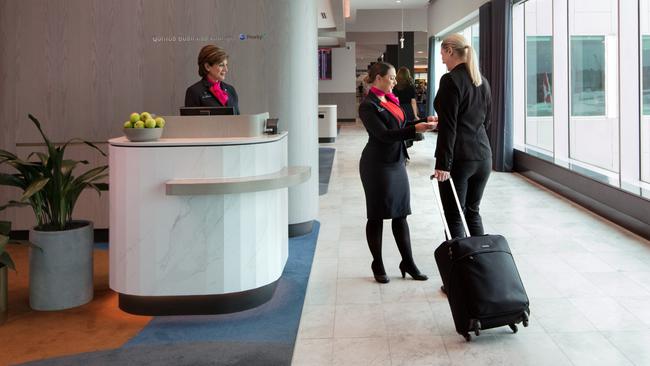Qantas looks overseas for green fuel as Australia lacks supply
Qantas has signed a second major deal with an overseas producer to supply the airline with sustainable aviation fuel, and upgraded enticements for business frequent flyers.

Qantas has done another major deal with an overseas producer of sustainable aviation fuel because Australia does not have its own supply.
US company Aemetis will provide 20 million litres of blended sustainable aviation fuel to Qantas every year from 2025, for the airline’s flights out of Los Angeles and San Francisco.
Qantas is already buying 10 million litres of SAF from bp in London for flights out of Heathrow, as part of the carrier’s commitment to reducing carbon emissions to zero by 2050.
Speaking in Los Angeles, Qantas Group CEO Alan Joyce said the airline was actively looking to source SAF for their operations but would prefer to buy local.
“At the moment we can only buy sustainable fuels offshore. The US, UK and Europe have industries that have developed with a lot of government support because this is a new field and the long term benefits for those countries are obvious,” said Mr Joyce.
“Qantas has already committed $50m to support the development of a SAF industry in Australia, and we’d be its biggest customer. As well as the environmental and economic benefits, a local SAF industry would reduce the nation’s dependence on imported fuels.”
Aemetic CEO Eric McAfee said there was considerable opportunity for Australia to produce SAF but it was not being embraced.
“Australia is a very unusual country in that it already produces the feedstock for sustainable aviation fuel and for renewable diesel but it largely exports that feedstock to other countries,” Mr McAfee said.
“There is an opportunity for domestic job creation and investment in Australia for production of SAF and California is an excellent template.”
Mr Joyce said there had never been a better time for the government to develop a SAF industry to provide energy security and price certainty.
With oil prices currently going through the roof as a result of Russia’s invasion of Ukraine, Qantas was expecting to increase fares 7 per cent on average to cover it.
“If you had this sustainable aviation fuel industry where the price did come down over time, it could be a lot more competitive against jet kerosene and that’s great for the travelling public,” said Mr Joyce.
The SAF deal was announced as Qantas flagged changes to its frequent flyer program for business travellers, as the “work trip” made a return.
For the first time, individuals who book through the Qantas Business Rewards program will earn points for their company as well as 250 bonus points for themselves, on top of the points and status credits they earn as a frequent flyer.
Qantas has also lowered the points threshold that businesses must reach to access new rewards such as reduced fares and discounted Qantas Club membership.
Instead of 20,000 points in a year, businesses now only need amass 15,000 points to get 6 per cent off base fares, with the rewards increasing in line with points earned.
Under the program that costs $89.50 to join, points can be “reinvested” back into the business to redeem on flights, or transferred to another frequent flyer account to reward team members.
Qantas domestic and international chief executive Andrew David said the overhaul was timed to reward business travellers as they returned to the skies after two years of Covid travel restrictions.
“Small and medium-size businesses are back flying at greater than 80 per cent of pre-Covid levels, which shows they are keen to reconnect with their teams, customers and clients and make up for lost time,” Mr David said on Tuesday.
“We know that businesses and their employees who fly regularly will appreciate these additional benefits.”







To join the conversation, please log in. Don't have an account? Register
Join the conversation, you are commenting as Logout